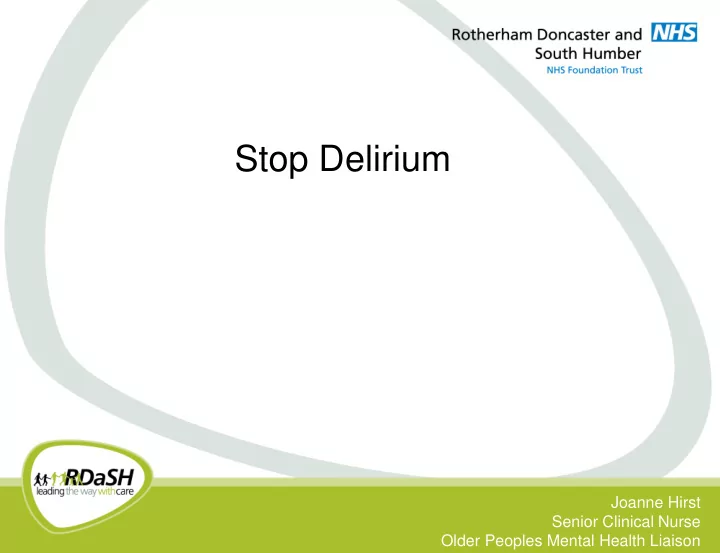

Stop Delirium Joanne Hirst Senior Clinical Nurse Older Peoples Mental Health Liaison
Background • Delirium has been recognised for millennia as a distressing condition associated with increased morbidity, mortality and healthcare costs. • It is a common health problem in older people • Research suggest that delirium affects up to 65% of older people admitted to hospital and that this is estimated to be as high in care home settings.
What is it • Delirium is the name of a Cirque du Soleil show that premiered in Montreal, Canada on February 26, 2006.
What is it • Delirium (acute confusional state) is most often caused by an acute physical illness or change to their circumstances. • Delirium is a condition that affects the patients brain for a short period of time. It is completely reversible if detected and treated quickly.
What is it • A sign that something is wrong • It’s a sudden change in a person mental state over a few hours or days and tends to vary during the day • People with delirium typically have difficulty paying attention to what is going on around them • DELIRIUM CAN LAST FOR WEEKS AND EVEN MONTHS IN OLDER PEOPLE
Prevalence • Delirium is a common problem • More than 30% of patients who suffer a stroke will also suffer from Delirium • 40-60% of patients who have a hip fracture will also suffer a Delirium • 20-40% of patients who have coronary or vascular surgery will also suffer Delirium • Delirium is as high as 80% among patients who are dying
Why is it Important • It is a sign that they may be physically ill • It can be stress for the person, their visitors and the staff caring for them • Delirium is often mistaken for worsening dementia or just old age
Risk Factors • Dementia- people with dementia are 5 times more likely of having delirium • Poor Vision or hearing problems Disorientation • • Dehydration • Constipation • Poor nutrition • Urine catheters Illness • • Immobility • Falls
Causes • Infection – commonly Urine, Chest • Withdrawal – alcohol, drugs • Trauma – falls • Acute vascular – in early days following a stroke • Constipation • Unstable blood sugars – for diabetics • Drugs – prescribed but side effects present • Environment – significant changes i.e. bereavement
Considerations • How can I help prevent falls • How can I help prevent dehydration • How can I prevent problems with medication • How can I help prevent disorientation • How can I help prevent constipation
Falls • Make sure residents can see properly, wear glasses if needed, adequate lighting • Remove clutter so residents don’t trip • Check that shoes fit correctly • Don’t give to much sedating medication • Make sure you do regular checks on residents known to get up often in the night.
Constipation • Allow privacy while toileting • Encourage residents to drink more fluids • Encourage appropriate regular exercise to help movement of intestine • Encourage eating fibre in the diet • Record bowel movements
Disorientation • Make sure residents use their glasses and hearing aids. Check that they are clean and working • Make sure that clocks, calendars and orientation boards can be easily seen and that they display correct information • Ensure adequate lighting • Encourage a good nights sleep; minimise day time napping if night sleep is a problem/no caffeine after teatime and provide a relaxing bedtime routine.
Infection • Wash your hands after each intervention with residents is especially important for those who have an infection • Make sure injections are up to do i.e flu jabs • Follow infection control procedures • Minimise the use of catheters.
Dehydration • Make sure water or juice is within easy reach all the time, in a cup the resident can manage • Prompt to drink a little every 30 minutes • If a resident is reluctant to drink find out why- they may be worried about incontinence. • Stress importance of fluid intake and arrange prompts to use the toilet frequently.
Medication • Review medications regularly with the residents GP or pharmacist • Make sure that residents take their medication. Stopping suddenly could bring on withdrawal symptoms • Make sure residents don't take someone else's medication. • Be aware of polypharmacy practice • Medication can be seen as a quick fix to an immediate issue, but in the longer term drugs themselves can cause delirium • i.e codeine, Tramadol, Steroids
Hyperactive delirium • Most commonly recognised delirium common features are • Agitation • Aggressive behaviours • Hallucinations • Restlessness
Hypoactive delirium • Less frequently recognised and often misdiagnosed as depression characterised by • Withdrawal • Low motivation • Generalised misery • Can often be environmental non clinical interventions such as offering time, support and familiarity can help.
Management of Delirium • Management of delirium can only occur if it is recognised • Essential to identify the cause and address them • Use of de-escalation skills is essential • Provide a suitable care environment • Effective communication • Orientation • Ongoing re-evaluation
Any Questions 01302 796505 07786312690 joanne.hirst@rdash.nhs.uk
Recommend
More recommend